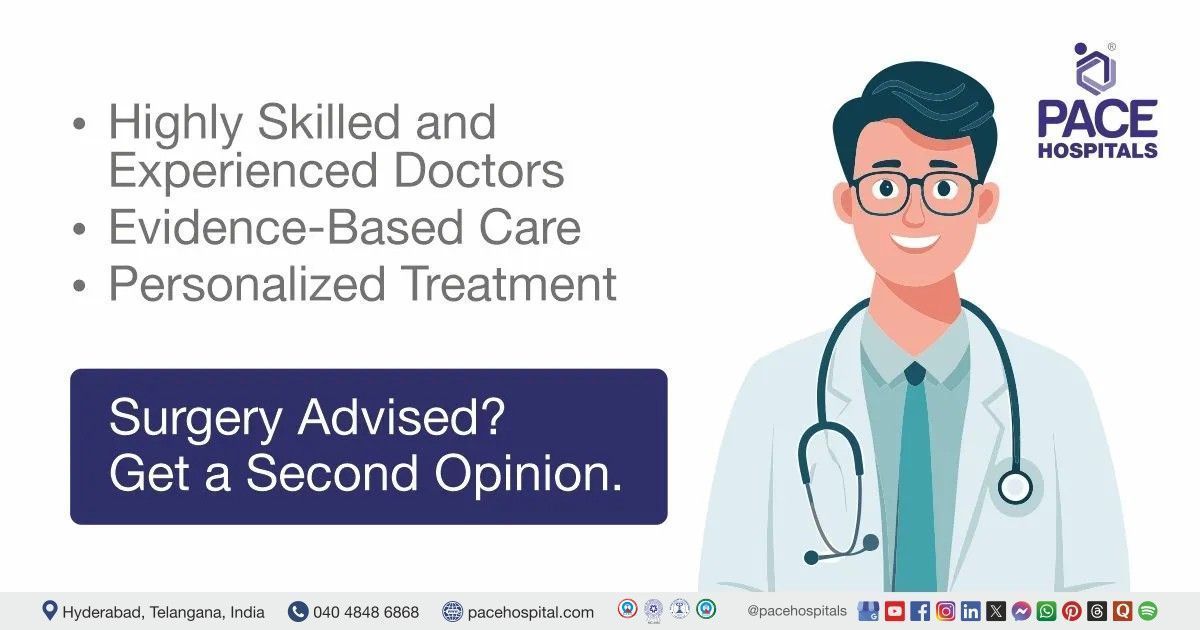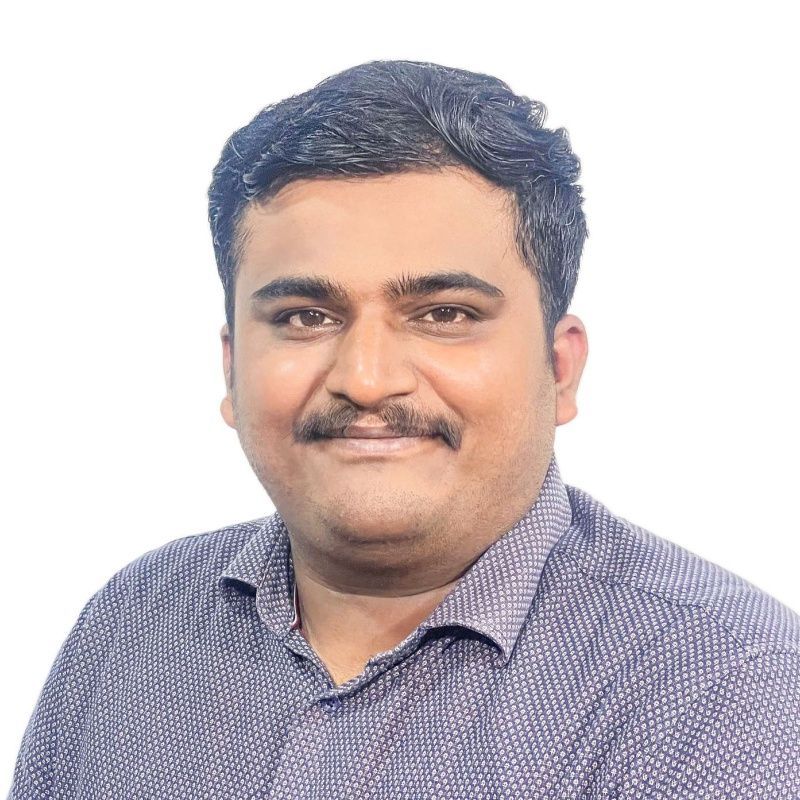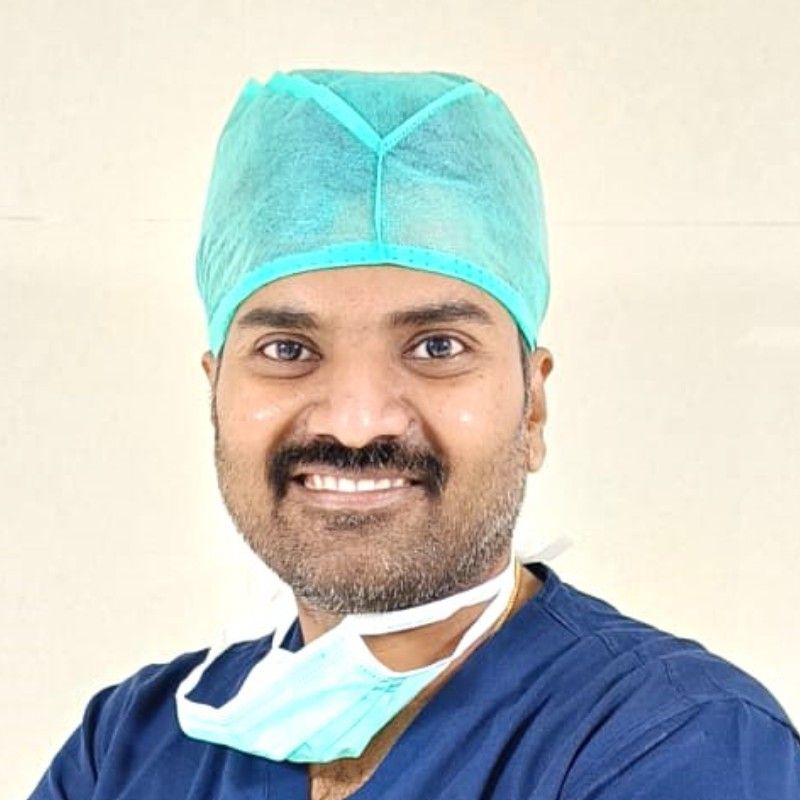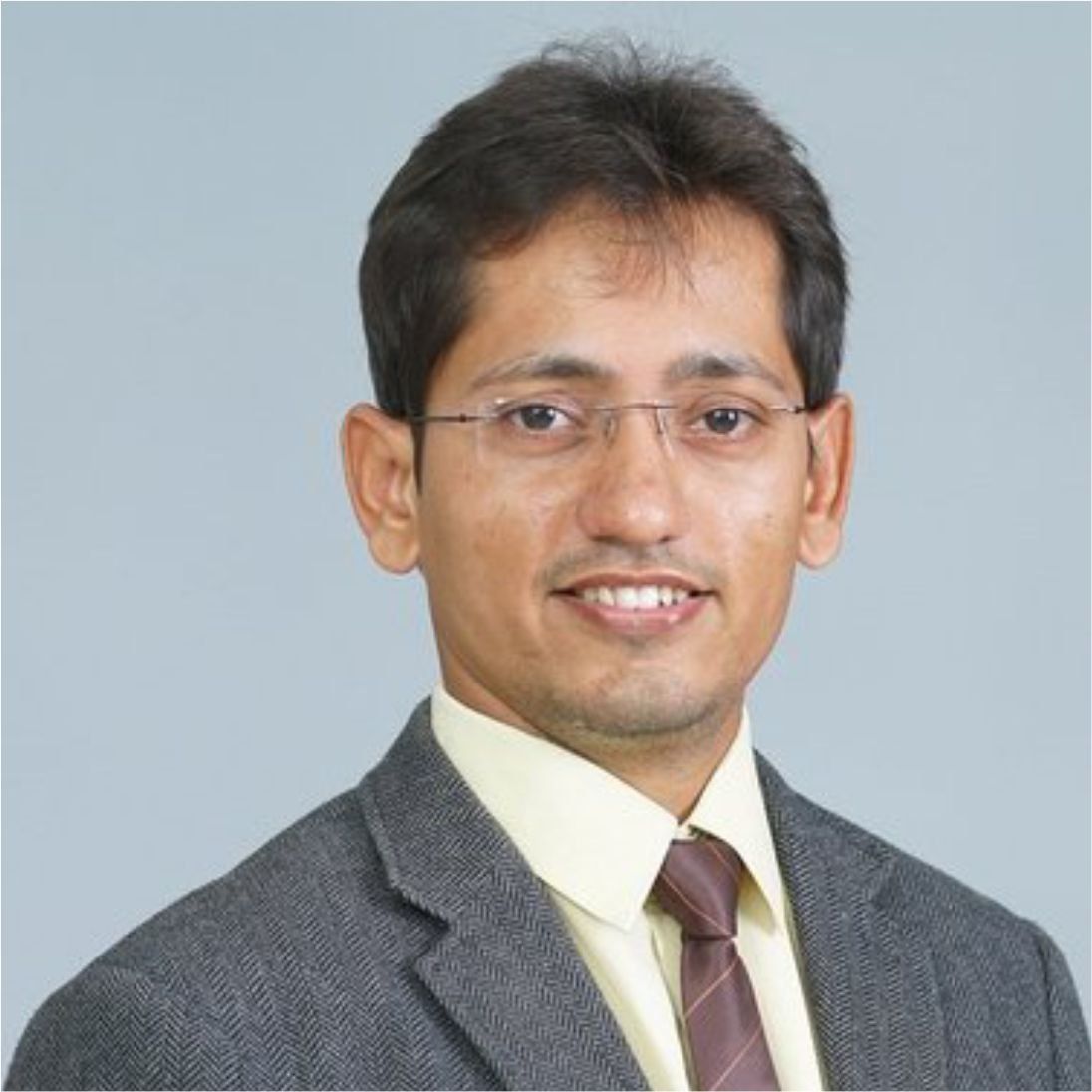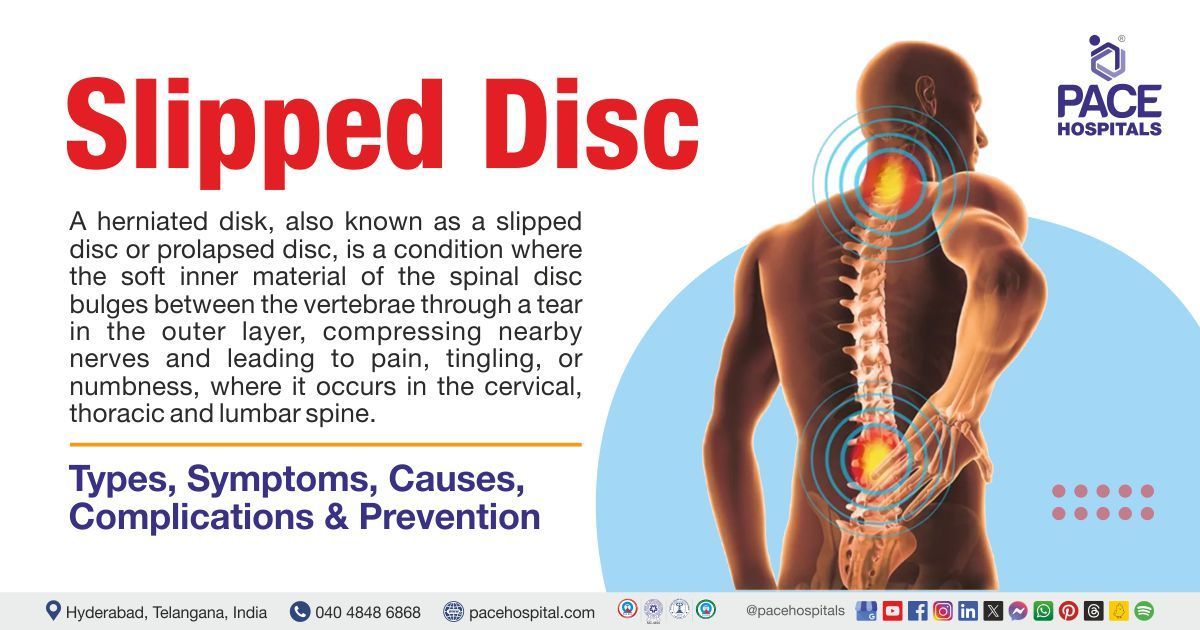Best Herniated Disc Specialist in Hyderabad for Accurate Diagnosis & Advanced Treatment
PACE Hospitals
✅ Recommended by 9,452 Happy Patients. Get hassle-free appointments with Herniated Disc Doctors.
Dr. U L Sandeep Varma
MBBS, M.S. (General Surgery), M.Ch (Neurosurgery), Post Doctoral Fellowship in Minimal Invasive and Advanced Spine Surgery
Experience : 10+ years
Consultant Brain and Spine Surgeon
Specialist
Brain and spine surgery, treating various forms of complex neurological conditions such as brain tumours, spinal cord tumours, cerebrovascular aneurysms, stroke, epilepsy, head trauma, spinal disorders, hydrocephalus, craniopharyngiomas neurological infections, neurological pain syndrome, complex spinal deformities, neurological trauma etc.
Expertise
Brain Tumor Surgery, Cervical and Lumbar disc disease, Scoliosis, Brain and Spine tumors, Skull base neurosurgery, Hydrocephalus, Epilepsy, Cranio Vertebral junction surgeries, Spine injuries and Neurotrauma.
Consultation Details
Languages Spoken: English, Hindi, Telugu
Timing: Mon to Sat - 9 AM to 6 PM
Location: PACE Hospitals, HITEC City
Dr. Raghuram
MBBS, DNB ORTHO, Fellowship in Joint Replacement and Arthroscopy, Fellowship in Shoulder and Upper limb, Sports medicine and Replacement
Experience : 10+ years
Orthopaedic Consultant, Trauma, Shoulder and Knee Arthroscopic Surgeon, Hip and Knee Joint Replacement Specialist
Specialist
Specialist in diagnosing, managing, and treating a wide range of orthopedic conditions, including complex and failed trauma cases, non-union and malunion fractures, joint replacements, revision surgeries, geriatric trauma, spine disorders, foot and ankle conditions, knee and shoulder pain, sports injuries, and arthritis.
Expertise
Joint Replacement Surgery
- Total Knee Replacement (TKR) & Total Hip Replacement (THR)
- Partial Knee Replacement (PKR)
- Revision Knee & Hip Replacement Surgeries
- Minimally Invasive Joint Replacement Techniques
Arthroscopy & Ligament Reconstruction
- Anterior Cruciate Ligament (ACL) Reconstruction
- Posterior Cruciate Ligament (PCL) & Medial Collateral Ligament (MCL) Repair
- Shoulder Arthroscopy & Shoulder Arthroplasty
- Meniscal & Cartilage Injury Management
Trauma & Fracture Management
- Complex & Failed Trauma Surgeries
- Non-Union & Malunion Fractures
- Geriatric Trauma & Revision Surgeries
Sports Injury & Rehabilitation
- Comprehensive treatment for sports-related injuries
- Shoulder Ligament & Cartilage Injury Treatment
Consultation Details
Languages Spoken: English, Hindi, Telugu
Timing: Mon to Sat - 9 AM to 6 PM
Location: PACE Hospitals, HITEC City & Madinaguda
Dr. Anand Agroya
MBBS, D.Ortho, Fellow in Joint Replacement, Arthroscopy & Sports Medicine
Experience : 15+ years
Senior Orthopaedic Consultant, Trauma Surgeon & Sports Medicine Specialist | Expert in Knee & Joint Replacement & Arthroscopy Surgery
Specialist
Specialist in advanced orthopedic care and sports injury management, focusing on knee and joint replacement, arthroscopy surgery, ligament reconstruction, fracture management, cartilage preservation, and joint restoration techniques.
Expertise
Knee & Joint Replacement
- Total Knee Replacement (TKR)
- Partial Knee Replacement (PKR)
- Robotic-Assisted Knee Replacement
- Revision Knee Replacement Surgery
Arthroscopy & Ligament Reconstruction
- ACL & PCL Ligament Repair & Reconstruction
- Meniscus Repair & Cartilage Preservation
- Shoulder Arthroscopy & Rotator Cuff Repair
Fracture Management & Trauma Care
- Expert in treating complex fractures & orthopedic trauma cases
- Minimally invasive techniques for faster recovery
Sports Injury Prevention & Rehabilitation
- Comprehensive treatment for sports-related injuries
- Personalized rehabilitation programs for athletes & active individuals
Joint Preservation & Cartilage Restoration
- Advanced joint preservation techniques to delay or prevent joint replacement
- Cartilage restoration for improved mobility & long-term joint health
Consultation Details
Languages Spoken: English, Hindi, Telugu
Timing: Mon to Sat -10 AM to 1 PM & 6 PM to 8 PM
Location: PACE Hospitals, HITEC City
Top Herniated Disc Doctors in Hyderabad for Fast Recovery with Personalized Non-Surgical to Surgical Care
PACE Hospitals is recognised for having the Top Herniated Disc Doctors in Hyderabad, India, supported by experienced herniated disc specialist doctors working alongside orthopaedic spine surgeons, neurosurgeons, neurologists, physiatrists, pain medicine specialists, and physiotherapists. The team delivers patient-centric evaluation and coordinated follow-up for lumbar and cervical disc herniation, sciatica, back or neck pain, numbness, and weakness.
Our doctors for herniated disc treatment follow a structured diagnostic pathway that includes a comprehensive clinical assessment, which consists of a review of posture and gait, a neurological examination to assess strength and sensation, and targeted bedside tests such as the straight-leg raise and Spurling's test. When required, advanced imaging and electrodiagnostic studies are arranged to confirm the level of nerve compression. Our trusted spine specialists ensure accurate cause identification from the first visit.
Our comprehensive care plans focus on safe herniated disc treatment, pairing physiotherapy, posture and core-strength training, activity modification, ergonomic counselling, and graded rehabilitation with image-guided pain procedures when appropriate. For refractory or recurrent cases, we assess candidacy for minimally invasive microdiscectomy or endoscopic discectomy, plan day-care pathways where suitable, and provide vigilant monitoring to ensure durable symptom control and improved function.
If you're looking for the
best herniated disc specialist in Hyderabad, India, PACE Hospitals is the ideal destination. We provide clear advice, hassle-free visits, and long-term follow-up to help achieve lasting relief, functional recovery, and an improved quality of life. Consult the
best doctor for herniated disc treatment in Hyderabad for a personalised plan and timely recovery.
Frequently Asked Questions on Herniated Disc
What is a herniated disc?
A herniated disc, also known as a slipped disc, happens when the soft centre of a spinal disc protrudes through a tear in its outer layer. This can irritate nearby nerves, leading to pain, numbness, or weakness, usually in the back, legs, or arms. It is most common in the lower back. Herniated discs can happen from injury, aging, or strain, and symptoms vary depending on the location and severity of the disc problem, often requiring care from an experienced herniated disc doctor.
What causes a herniated disc?
Herniated discs are primarily caused by age-related wear and tear that weakens the disc’s outer layer. Other causes include sudden strain or injury from heavy lifting, bending, or twisting improperly. Genetic factors and occupational or sports activities that stress the spine also increase risk. The outer disc can tear, allowing the soft center to bulge out and sometimes press on nerves, which may require evaluation by a doctor for herniated disc.
Can a herniated disc be cured?
A herniated disc often improves over time with proper care, and in many cases, symptoms can go away completely. While the disc may not return to its exact original shape, the pain and other symptoms can be fully resolved with rest, physical therapy, and medications. In more serious cases, surgery might be needed, but many people recover without needing it under the supervision of a herniated disc treatment doctor.
Can a herniated disc be cured without surgery?
Yes, many herniated discs heal without surgery. Conservative treatments like rest, pain relief, medications, physical therapy, and avoiding activities that worsen symptoms are effective for most people. The body often reabsorbs the herniated material over weeks to months, relieving nerve pressure. Surgery is usually a last option reserved for severe nerve damage or if symptoms persist despite treatment, which can be guided by a herniated disc treatment specialist.
What are the treatments for herniated discs?
Treatment options for a herniated disc usually start with non-surgical methods. These include rest, physical therapy, pain relievers, anti-inflammatory drugs, and lifestyle changes like improving posture. Heat or cold therapy and gentle exercise may also help. If symptoms continue, steroid injections may be recommended. Surgery is only recommended for severe cases with nerve damage, loss of function, or long-term pain, where many patients consult Top herniated disc treatment specialists in Hyderabad at PACE Hospitals.
Which type of doctor should I consult for herniated disc?
A herniated disc is usually treated by different types of doctors depending on the symptoms and severity. Initial evaluation is often done by a primary care physician, who may then refer to a specialist. A neurologist treats nerve-related symptoms, whereas an orthopaedic spine specialist or neurosurgeon handles more serious cases, especially those that require surgery. A physical medicine and rehabilitation (PM&R) doctor or physical therapist can help with pain relief and recovery in non-surgical settings, but many patients seek the best doctors for herniated disc treatment at PACE Hospitals in Hyderabad, India.
Is walking good for a herniated disc?
Yes, walking is generally beneficial for people with a
herniated disc because it promotes blood flow, helps maintain spine mobility, and reduces stiffness. It is a low-impact exercise that can aid recovery when done carefully and gradually increased. However, patients should avoid walking long distances if it worsens their symptoms and consult healthcare providers to tailor an appropriate activity plan with advice from a
good doctor for herniated disc.
Does a back brace help a herniated disc?
A back brace may help relieve pain and provide support for people with a herniated disc, especially during certain activities. It can reduce movement that might worsen the condition and give the muscles time to rest. However, long-term use is not usually recommended, as it may weaken core muscles. A brace is most effective when used short-term, along with physical therapy and other non-surgical treatments under medical supervision from a
trusted herniated disc specialist.
Can a bulging disc become a herniated disc?
Yes, a bulging disc can progress to a herniated disc. A bulging disc refers to the disc extending outside its normal space but without rupture, while a herniated disc occurs when the outer layer of the disc tears, allowing the inner gel-like material to leak out. This leakage may irritate nearby nerves and cause more severe symptoms. Over time, if the bulge worsens or the disc’s outer layer weakens, herniation may develop and need care from an
expert herniated disc doctor.
Can stretching make a herniated disc worse?
Yes, some types of stretching can make a herniated disc worse, especially if they involve twisting or bending the spine too much. Certain movements may increase pressure on the disc or irritate nearby nerves. Gentle, guided stretching may help relieve symptoms, but it should be done under the direction of a physical therapist or doctor. Safe exercises are chosen based on the disc's location and the individual's condition and may be advised by a
specialist for herniated disc.
How does a herniated disc affect pregnancy?
A herniated disc during pregnancy can cause back or leg pain due to extra pressure on the spine and nerves. Hormonal changes and weight gain may worsen symptoms. Most cases can be managed with rest, physical therapy, and posture adjustments. Pain medications are used carefully during pregnancy. Severe cases are rare but may require further evaluation by a
trusted herniated disc specialist.
Can a herniated disc cause permanent nerve damage?
Yes, in rare cases, a herniated disc causes permanent nerve damage if the spinal nerves are compressed for a long time. This may lead to lasting pain, numbness, weakness, or difficulty controlling the bladder or bowel. Early diagnosis and treatment greatly reduce this risk. If symptoms like severe leg pain, foot drop, or loss of bladder control occur, immediate medical attention is important to prevent long-term damage, which can be handled by the
best herniated disc doctors in Hyderabad.
How does traction help a herniated disc?
Traction therapy gently stretches the spine, which can help reduce pressure on a herniated disc. This stretching increases the space between the vertebrae, reducing strain on the nerves and discs. Traction can help relieve pain and muscle spasms by decompressing the spinal discs and improving alignment. However, traction is generally one part of a broader treatment plan and may not work for everyone with herniated discs, so it is best overseen by a
herniated disc treatment doctor.
How to diagnose a herniated disc?
Diagnosis starts with a medical history and physical exam where a doctor checks for pain, muscle strength, reflexes, and sensation. To confirm the diagnosis, imaging tests like
MRI are most commonly used since they show soft tissues like discs and nerves clearly.
CT scans, X-rays, and sometimes nerve tests such as electromyograms (EMG) may also help determine the exact cause and nerve involvement, usually guided by an
experienced herniated disc doctor.
What surgery is done for a herniated disc?
The most common surgery for a herniated disc is microdiscectomy, where the part of the disc pressing on a nerve is removed through a small incision. In more severe cases, a laminectomy (removal of part of the bone) or spinal fusion may be required. These surgeries are intended to relieve pain and restore function. Most are minimally invasive and recommended only when non-surgical treatments have failed, performed by the
best doctors for herniated disc in Hyderabad, India.
Can a disc herniation be reversed?
Disc herniation cannot be completely reversed, but symptoms may improve significantly with conservative treatments such as physical therapy, medications, and rest. The body can sometimes reduce inflammation and gradually reabsorb some herniated disc material, easing symptoms. However, the actual structural herniation rarely fully heals on its own, and if symptoms are severe or persistent, medical interventions, including surgery, may be necessary under the care of an
expert herniated disc doctor.
Can a herniated disc lead to paralysis?
Paralysis from a herniated disc is rare but possible if the spinal cord or nerve roots are severely compressed for a long time. This can lead to permanent nerve damage. Warning signs include loss of feeling, weakness, or trouble controlling the bladder or bowel. These symptoms require immediate medical attention. With early treatment, the risk of paralysis is very low, and most people recover without long-term problems when treated by a
specialist for herniated disc.
Can a herniated disc recur?
Yes, a herniated disc can recur at the same or a different level of the spine. Recurrence is more likely in people who return to heavy lifting, have poor posture, or do not follow rehabilitation guidelines. Even after surgery, a new herniation can develop. Regular exercise, maintaining a healthy weight, and proper body mechanics help reduce the risk of recurrence. Follow-up care is important for long-term spine health and should be monitored by an
experienced herniated disc doctor.
Are herniated discs genetic?
Yes, genetics can play a role in herniated discs. Studies suggest that people with a family history of disc problems may be more likely to develop disc degeneration and herniation. Inherited characteristics such as disc shape, flexibility, and connective tissue strength may contribute. However, lifestyle factors like physical activity, posture, and body weight all have an impact on risk. Both genetics and environment work together in determining who may be affected, and an evaluation by an
experienced herniated disc doctor is recommended.
What are the potential complications?
If untreated, a herniated disc can lead to serious complications. These include long-term nerve damage, chronic pain, or weakness in the arms or legs. In rare cases, it can compress nerves that control bladder or bowel function, a condition called cauda equina syndrome, which requires emergency care. A herniated disc can also limit movement and reduce quality of life. Early diagnosis and proper treatment greatly reduce the risk of lasting problems, and many patients consult the
best herniated disc doctors in Hyderabad at PACE Hospitals for advanced care.
What our patients have to say
Why choose PACE Hospitals?
- A Multi-Super Speciality Hospital.
- NABH, NABL, NBE & NABH - Nursing Excellence accreditation.
- State-of-the-art Liver and Kidney transplant centre.
- Empanelled with all TPAs for smooth cashless benefits.
- Centralized HIMS (Hospital Information System).
- Computerized health records available via website.
- Minimum waiting time for Inpatient and Outpatient.
- Round-the-clock guidance from highly qualified super specialist doctors, surgeons and physicians.
- Standardization of ethical medical care.
- 24X7 Outpatient & Inpatient Pharmacy Services.
- State-of-the-art operation theaters.
- Intensive Care Units (Surgical and Medical) with ISO-9001 accreditation.
Share on
Request an appointment
Fill in the appointment form or call us instantly to book a confirmed appointment with our super specialist at 04048486868
Appointment request - health articles
Recent Articles


